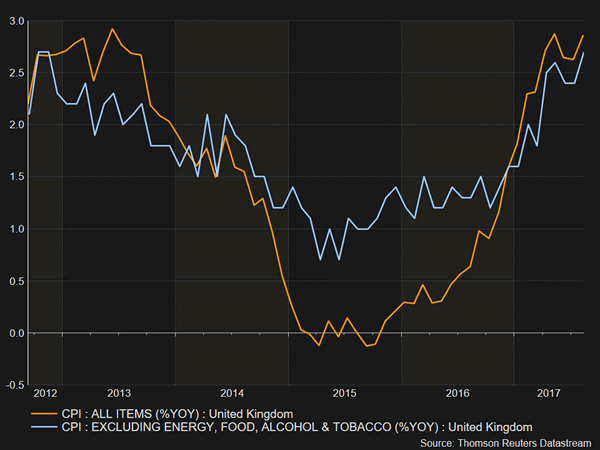The pound climbed by almost 1% on Tuesday during the European trading hours, hitting a one-year high against the greenback and extending gains versus the euro after the widely expected UK inflation figures for the month of August came in stronger than expected. With consumer prices rising to a four-year high reached first on May, BOE policymakers will consider seriously whether to deliver a rate hike on Thursday as inflation continues growing above the central bank’s target but wages remain subdued.
According to the National Office for Statistics, consumer prices rose by 2.9% on a yearly basis in August, above the forecast of 2.8% and July’s mark of 2.6%. Month-on-month, inflation turned positive to 0.6% from a negative 0.1% seen in the previous month, posting the highest increase in six months. The pickup in inflation emerged as households spent more on clothing and footwear ahead of the autumn season, with the sector experiencing the biggest increase in prices in almost 30 years. Particularly, clothing and footwear prices rose by 2.4% m/m and 4.6% y/y. Moreover, the pound’s depreciation following the Brexit vote in June 2016, lifted import costs and consequently drove the CPI index higher.
Excluding energy and food items, the yearly core CPI index jumped by 0.3 percentage points to 2.7%, exceeding the expectations for a rise of 2.5%.

In another report, UK producer prices jumped surprisingly higher in August as well due to the exchange rate’s weakness and increased fuel costs. The cost of inputs, which are mainly imported, bounced up by 7.6% y/y from a 6.2% gain seen in July (downwardly revised from 6.5%), surpassing the forecast of 7.3%. The monthly rate was up by 1.6%, above the 1.3% expected and the negative 0.2% observed in the previous month (downwardly revised from 0.0%).
Regarding the cost of outputs, this climbed by 0.2 percentage points to 3.4% y/y, surprising analysts who anticipated the rate to increase to 3.1%. The monthly change stood at 0.3 percentage points with the output PPI jumping from 0.1% in July to 0.4%.
Even though the above inflation numbers are seen encouraging a rate hike, as prices continue to hover above the Bank of England’s target of 2% since February, BOE policymakers will feel their hands tied when they look at wage growth. British average earnings excluding bonuses grew by 2.1% in June, far below the inflation rate, and are expected to climb slowly to 2.2% in July. Nevertheless, the government’s passage of the EU withdrawal bill voted yesterday, which removed a layer of political uncertainty, will probably provide some relief to BOE members who are expected to gather tomorrow to decide on interest rates.
Looking at forex markets, pound/dollar hit a one-year high of 1.3287 before it slipped to 1.3274, while euro/pound extended its losses made earlier touching a fresh one-month low below 90 pence at 0.8981.
